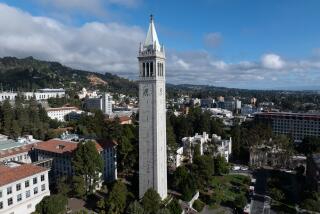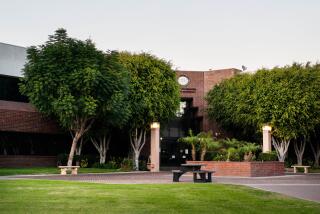Peace a vocation for dean of new school
- Share via
SAN DIEGO -- How much world peace will $50 million buy?
That is not exactly the question facing Father William Headley in his first weeks as the founding dean of the Joan B. Kroc School of Peace Studies at the University of San Diego. But Headley is in the enviable position of leading an institution with that amount to train generations of diplomats, relief workers and experts in conflict resolution.
That’s because Kroc, the billionaire McDonald’s hamburger chain heiress, left $50 million after her 2003 death for a new peace studies school and a related, preexisting think tank at the Catholic university perched on the bluffs above Sea World.
She previously had given the university about $30 million that was used to, among other things, construct a 90,000-square-foot, Spanish-style building to house those programs.
Aware that many colleges offer traditional degrees in international relations, Kroc wanted something different, a place devoted to what she described as “not only talking about peace, but making peace.”
Her motto seems to align with Headley’s life story. “This is not a job for me; it’s a vocation. It’s in my bones,” said the 69-year-old priest, who has vast overseas experience, in part from his previous high-ranking job at Catholic Relief Services.
A former counselor to the agency’s president, he helped coordinate aid amid ethnic strife in Africa and the Balkans and in tsunami-ravaged parts of South Asia.
Headley is determined to show that peace studies deserves its Aug. 1 elevation into a full-blooded school -- one of six, including business and law, at the 7,500-student university.
Skeptics should take note of all the conflicts around the world today, Headley said.
“Particularly now and particularly in our country, there are some questions about how the standard military approach to these things is working,” he said. “People are looking for some new answers,” he said during an interview in the six-year-old Kroc building where a portrait of the late donor, who had owned the Padres baseball team in San Diego, is prominently displayed.
Headley declined to state his own position on the Iraq war. He described himself as generally, but not absolutely, pacifistic.
“I have to allow in my intellectual thinking for the possibility of supporting” a war, he said, adding that he has long studied the Catholic doctrine of “a just war,” which permits war only as a last resort against an aggressor and only if it does not create evils worse than the one eliminated.
Many of his views were forged in the tumult of the 1960s. As a young, white, Philadelphia-born priest in the Congregation of the Holy Spirit order, he worked in African American parishes in South Carolina during the civil rights movement.
Although not an active protester against the Vietnam War, he said he remains deeply affected by the experience of his younger brother, a Marine who was badly wounded in Vietnam in 1968 and remains disabled.
Headley rose to become the leader of his order’s eastern U.S. province and later headed its international efforts at peace and justice out of Rome. He has researched peace-making efforts in India, Northern Ireland, South Africa, Israel and the Palestinian territories.
Headley, who has a doctorate in sociology from New York University, established a graduate program in conflict resolution and peace studies at Duquesne University in Pittsburgh, where he taught.
Though he is still considering his plans for the San Diego school, he is expected to sharply expand a small master’s degree program that began five years ago and was run through another academic unit. It enrolls about a dozen students and is expected to have about 30 within two years.
There are plans to hire about five professors initially while continuing to have some courses taught by teachers from other parts of the university. A peace studies program for undergraduates is to be upgraded from what is now a minor to a full degree major by next year, officials said.
Headley also hopes to raise the profiles of the related Kroc-funded think tank that has a solid track record of sponsoring a wide range of international research, exchanges and peace activism and of a separate center, also to be merged into the new school, that focuses on issues along the U.S.-Mexico border.
The peace school’s mission goes beyond the formal diplomacy Headley describes as negotiating treaties at “mahogany tables.”
Courses for the yearlong master’s degree include international negotiations, comparative religious ethics, environmental justice and computerized geographic mapping.
Most of this year’s graduate students spent much of July in refugee camps in Tanzania, on a trip they organized to do research and develop mobile health clinics. Alumni are working in international diplomacy, human rights organizations and at U.S. and overseas charities, among other places.
Headley said he had early concerns about heading a peace program in San Diego, a city with a huge military presence that, he conceded, might not automatically welcome his ideas.
“It was a consideration when I came out here, wondering whether I could hack my trade -- to put it crudely -- in an environment which has a reputation as being relatively conservative and has a very strong military base,” he said. But he said he has long had excellent relations with military officers and expects military personnel to enroll as students and teach at the new school.
He also wants potential students to know that the peace studies program offers a lay education even though it is set at a Catholic university.
“I am a Catholic priest, and I make no apologies for that,” Headley said. “I think it influences my perspective on things. But I know this has to be interreligious. Otherwise it would be feeding into the very problems that cause many conflicts in the world.”
Some students and faculty complained about the long time it took to hire a peace studies dean. However, university officials said the $50-million gift took them by surprise, so they needed time to decide on its use.
University Provost Julie H. Sullivan attributed some delays to the peace school’s untraditional and cross-disciplinary nature and difficulties in finding someone like Headley who combined academic credentials with real-world experience at “peace building at the core of his identity.”
The number of U.S. universities and colleges offering some form of peace studies has grown tenfold over the last two decades to about 200, according to the Peace and Justice Studies Assn., a group housed at the University of San Francisco.
Among the most prominent programs is the University of Notre Dame’s 20-year-old Joan B. Kroc Institute for International Peace Studies. Kroc gave that Indiana institute about $71 million, including $50 million after her death. It enrolls 40 master’s degree students and 200 undergraduates who take peace studies as a double major, institute Director R. Scott Appleby said.
Appleby praised Headley as “an effective builder of peace with hands-on experience,” but said he should prepare for possible political controversies.
Notre Dame, for example, hired Tariq Ramadan, a prominent Islamic scholar from Switzerland. Then U.S. authorities in 2004 revoked Ramadan’s visa before he left Europe because of donations he made to charities that the government contended aided Palestinian terrorists.
Ramadan, denying any known connections to terrorism, resigned the Notre Dame professorship and never made it to the campus.
In San Diego, even a big endowment will not shield the school from critics who think “the very idea of putting money into studying peace is somehow contrary to patriotism,” said Mark Lance, a philosophy professor who runs a justice and peace studies program for undergraduates at Georgetown University.
However, professor I. William Zartman, director of the conflict management program at the School of Advanced International Studies at Johns Hopkins University, urged the new San Diego school to have a solid grounding in international relations and history to avoid being seen as a “goody, goody program.” It needs faculty who can tell students “how to use power instead of just saying power is a bad thing,” Zartman said.
Headley said he was ready for such discussions and for some discouragement about continuing violence in the world. But he said he always hopes for peace.
“That is part of my vocation,” he said. “That is part of the sustenance I take from my religious background: that there is always hope.”
--
More to Read
Sign up for Essential California
The most important California stories and recommendations in your inbox every morning.
You may occasionally receive promotional content from the Los Angeles Times.











